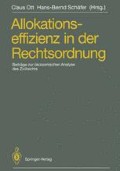Zusammenfassung
Womit fängt Theorie an;mit dem Versuch, jenseits von Interessenstandpunkten die Welt zu verstehen, mit dem Versuch, ein politisches Programm zu rechtfertigen,oder mit einer Reihe von Glaubenssätzen darüber, wie die Welt begriffen werden sollte? Ist das Endziel wissenschaftlich, politisch oder philosophisch? Ein guter Teil der Kontroverse, die sich um den Stellenwert der Wirtschaftswissenschaften in den Rechtswissenschaften und der Rechtswissenschaften in den Wirtschaftswissenschaften abspielt, ist in ihrem Kern eine Debatte über die grundlegenden Ziele derjenigen, die interdisziplinäre Arbeit versuchen. Handelt es sich um Sozialwissenschaftler, die das Handwerkszeug der ökonomischen Theorie zu benutzen versuchen, um rechtliche Phänomene zu verstehen? Sind sie Repräsentanten der politischen Rechten(oder Linken), die Rechtfertigungen für den Laissez-Faire-Kapitalismus und den Minimalstaat (oder den Wohlfahrtsstaat und öffentliche Regulierung) suchen? Sind sie philosophische Utilitaristen, Kantianer, Liberale oder was immer, die ihre normativen Argumente durch den Gebrauch der ökonomischen Theorie abstützen wollen? Recht und Ökonomie können niemals einfach abstrakte Sozialwissenschaften sein. Ihr Subjekt ist »das Recht« und das Recht ist untrennbar mit Politik und Philosophie verbunden.2 Da alle drei Bereiche in verschiedenen Mischungen in der ökonomischen Befassung mit Rechtsfragen enthalten sind, wird die Debatte um den Wert dieser Forschung dadurch erschwert, daß Kritiker und Vertreter dieser Richtung leicht zwischen diese Kategorien fallen.
Übersetzung von Hans-Bernd Schäfer, eine englische Version dieses Artikels erscheint in Mercuro, N., (Hrsg.), Law and Economics: Developments, Tensions, Prospects, (Kluver, Norwell, Mass.)
Access this chapter
Tax calculation will be finalised at checkout
Purchases are for personal use only
Preview
Unable to display preview. Download preview PDF.
Notes
Minda, G., The Law and Economics and Critical Legal Studies movements in American Law, und Rowley, C., Public Choice, Law and Economics, in: Mercuro,N.(Hrsg.), Law and Economics, Boston 1988
Posner, R., Economic Analysis of Law, 3.Aufl, Boston 1986
Coase, R., The Problem of Social Costs. Journal of Law and Economics, Vol.3 (1960), S.1 ff.
Cooter,R./ Kornhauser,L., Can Ligitation improve the Law without the Help of Judges?, Journal of Legal Studies, Vol.9 (1982), S.139 ff.
Einen Überblick über die Forschung auf diesem Gebiet geben zwei führende Vertreter der Chicago Schule: Landes,W./ Posner,R., The Economic Structure of Tort Law, Cambridge 1987
Polinsky, A.M., An Introduction to Law and Economics, Boston 1983 (Polinsky, A.M.) S.25 ff.
Calabresi, G./Melamed,A.D., Property Rules, Liability Rules and Inalienability: One View of the Cathedral, Harvard Law Review, Vol.85 (1972), S.1089 ff.
Balkin betont diesen letzten Punkt ausdrücklich: Balkin, J.M., Too Good to True: The Positive Economic Theory of Law., Columbia Law Review, Vol.87 (1987), S.1447 ff. (Balkin,J.M.)
Demsetz, H., The Exchange and Enforcement of Property Rights. Journal of Law and Economics, Vol.7 (1964),S.11 ff.; ders., Toward a Theory of Property Rights, American Economic Review, Vol.57 (May 1967) S.347 ff. Ein Teil dieser Abhandlungen ist wiedergegeben bei Schmid (Anm. 10 ).
Anderson, H./ Hill, P.J., The Evolution of Property Rights: a Study of the American West. Journal of Law and Economics, Vol.8 (1975), S.163 ff.
Gaffney, N., Economic Aspects of Water Resource Policy. American Journal of Economics and Sociology, Vol.28 (1969), S.131 ff.
Davis, L./ North, D., Institutional Change and American Economic Growth, London 1971; North, D./ Thomas,R., The Rise of the Western World, New York 1973
Macaulay, S., Non-Contractual Relations in Business, American Sociology Review, Vol.28 (1963), S.55 ff.
Standardwerke sind Musgrave, R./ Musgrave, P., Public Finance, 4.Aufl., New York 1983; Okun, A., Equality and Efficiency: The Big Tradeoff, Washington 1975; Jaskow, P./ Noll,R., Regulation in Theory and Practice: An Overview, in: Fromm, G. (Hrsg.), Studies in Public Regulation, Cambridge 1981, S.1 ff.
Arrow, K., Social Choice and Individual Values,1951, 2.Aufl. New Haven 1963
Rowley, C., S.42-46, gibt der normativen Arbeit der »Virginia Schule« den Vorzug, repräsentiert durch Buchanan, J., The Limits of Liberty: Between Anarchy and Leviathan, Chicago 1975
Einen Überblick über die von Arrow beeinflußten Forschungen geben Mueller, D., Public Choice, Cambridge 1979; Ordeshook, P., Game Theory and Political Theory, Cambridge 1986; Sen, A.K., Collective Choice and Social Welfare, San Francisco 1970
Mayhew, D., Congress: the Electoral Connection, New Haven 1974; Fiorina, M., Congress: Keystone of the Washington Establishment, New Haven 1977; Ferejohn, J., Pork Barrel Politics, Stanford 1974; Shepsle, K., The Positive Theory of Legislative Institutions: an Enrichment of Social Choice and Spital Models, Public Choice, Vol.50 (1978), S.135 ff.
Downs,A., An Economic Theory of Democracy, New York 1957; Olson, M., The Logic of Collective Action, Cambridge 1965; Baumol, W., Welfare Economics and the Theory of State, Cambridge 1967; Buchanan, J./Tullock, G., The Calculus of Consent, Ann Arbor, 1962; vgl. Rowley, C. (Anm. 1), S.33 ff.
Ordeshook (Anm. 38); Shubik, M., A Gametheoretic Approach to Political Economy, Cambridge, Mass., 1984
Buchanan,J., Anm. 37; Brennen, G./Buchanan,J., The Power to Tax, New York 1980
May, K.O., A Set of independent, necessary and sufficient Conditions for simple majority Rule, Econometrica, Vol.20 (1952), S.680 ff. May legt eine sogenannte Neutralitätsbedingung zugrunde, die garantiert, daß keine Alternative im benutzten Verfahren einen Sonderstatus erhält.
Farber, D./ Frickey,P., The Jurisprudence of Public Choice, Texas Law Review, Vol.65 (1987) S. 873 ff.
Rowley,C. (Anm. 1); Veljanovski, C., The Role of Economics in the Common Law, Research in Law and Economics, Vol.7 (1985), S.41 ff.
Kennedy,D., »Cost-Benefit analysis of entitlement programs«, Stanford Law Review.,Vo1.33, S387 ff. und Kelman, M., »Comment«, Columbia Law Review, Vol.85 (1985), S 1037 ff. Aber vgl. Minda, G., (Anm. 1), für einen Versuch, die Gemeinsamkeiten zwischen CLS, Recht und Ökonomie hervorzuheben.
Editor information
Editors and Affiliations
Rights and permissions
Copyright information
© 1989 Springer-Verlag Berlin · Heidelberg
About this paper
Cite this paper
Rose-Ackerman, S. (1989). Recht und Ökonomie: Paradigma, Politik oder Philosophie. In: Ott, C., Schäfer, HB. (eds) Allokationseffizienz in der Rechtsordnung. Springer, Berlin, Heidelberg. https://doi.org/10.1007/978-3-642-74726-7_29
Download citation
DOI: https://doi.org/10.1007/978-3-642-74726-7_29
Publisher Name: Springer, Berlin, Heidelberg
Print ISBN: 978-3-642-74727-4
Online ISBN: 978-3-642-74726-7
eBook Packages: Springer Book Archive

